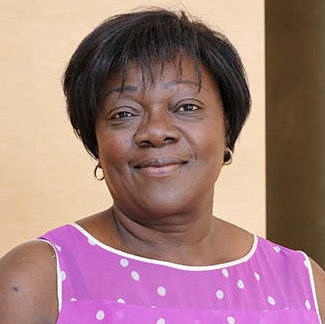La version française suit la version anglaise.
At Glendon Campus, researchers’ multidisciplinary and interdisciplinary approaches to complex problems provide solutions to current issues. In the context of COVID-19, social sciences and humanities are important to identify and unpack the societal effects of the pandemic, beyond the biomedical concerns.
Glendon researchers, Gertrude Mianda and Shirin Shahrokni, conduct research in separate disciplines to explore the effects of systemic racism and discrimination on specific racial groups in Canada.
- Professor Gertrude Mianda
- Shirin Shahrokni
Mianda is a full professor in Glendon’s Gender and Women’s Studies program who focuses her research on the experiences of discrimination lived by francophone immigrants from Sub-Saharan Africa in Canada. The current director of The Harriet Tubman Institute for Research on Africa and its Diasporas at York University, Mianda works to expand the Institute’s membership to include francophones belonging to both African and West Indian communities.
Shahrokni is an assistant professor of sociology at Glendon. She is the principal investigator of a Social Sciences and Humanities Research Council (SSHRC)-funded research project on the socio-professional trajectories and experiences of francophone immigrants in Toronto, through critical race and feminist perspectives. Shahrokni is also the co-investigator of a SSHRC-funded research project titled the “Racialization of Asian International Students” (RAIS) with principal investigator and Glendon associate professor Jean Michel Montsion. The project investigates the racialization experiences of international Asian students across five Canadian universities.
Though distinct in their research initiatives, Mianda’s and Shahrokni’s central concerns with the impacts of discrimination on racial groups provide insights and research data relevant to better understanding the disproportionate effects of COVID-19 on racialized populations.
On the issue of equity in access to housing, health care and employment, Mianda and Shahrokni acknowledge that COVID-19 has reinforced the presence of deep divides in social structures among racial and non-racial groups.
“COVID-19 has exposed white privilege and the marginalization of racialized individuals in the west,” says Mianda.
In her research, Mianda exposes how systemic discrimination of francophones from Sub-Saharan Africa in Canada leads to their overrepresentation in low income employment.
Mianda explains that because immigrants from Sub-Saharan Africa are members of Canada’s Black population – a group marginalized by structural inequities – their place in front-line positions at the bottom of the occupational scale increases their likelihood of exposure and infection to COVID-19.
Shahrokni’s research aims to highlight the mechanisms that produce racial inequalities across mainstream institutions and their effects on racialized individuals.
In the context of COVID-19, Shahrokni’s research provides relevant information about structural inequalities to understand specific challenges the pandemic presents to various racial groups.
Shahrokni points out that without recognizing the different effects of COVID-19 on racialized communities, inadequate one-size-fits-all solutions to challenges in housing, in employment and healthcare are proposed.
“We obviously have all been hearing and repeating to one another that we should ‘stay home,’” Shahrokni said. “It seems simple, effortless, but the ability to ‘stay home’ for a prolonged period with limited outdoor activities is not readily accessible to all of us.”
Shahrokni continues to outline inequities in social structures by highlighting the disparities in access to health care for racialized groups and Indigenous people. She also explains that while the issue of accessibility heightens the impact of COVID-19 on these communities, the sense of distrust among their members vis-à-vis the health care system is also a significant factor.
“Because of repeated experiences of racism within the healthcare system […],” Shahrokni says, “many members of racialized and Indigenous communities will tend to distrust and avoid recourse to the health care system even if their medical conditions require assistance.”
Without a discussion of the different impacts of COVID-19 on various racial groups, there is a failure to recognize the continued existence of systemic inequalities in contemporary society, and the lack of statistical data on race in Ontario plays a major role in this.
Mianda’s and Shahrokni’s various scholarly contributions on systemic discrimination in Canada further highlight the structural inequalities experienced by racialized individuals and communities, indicating how such discrimination is exacerbated and dangerous in times of crisis.
Their research is supported by the Glendon Research and Innovation Office.
Written by Carli Gardner, bilingual research support, Glendon Campus
Les approches multidisciplinaires et interdisciplinaires du personnel de recherche du campus Glendon face à des problèmes complexes apportent des solutions à des questions d’actualité. Dans le contexte de la COVID-19, les sciences sociales et humaines sont importantes pour déterminer et analyser les effets sociétaux de la pandémie au-delà des préoccupations biomédicales.
Deux chercheuses de Glendon, Gertrude Mianda et Shirin Shahrokni, mènent dans leur discipline respective des recherches qui explorent la discrimination raciale systémique sur différents groupes racialisés au Canada.
- Professor Gertrude Mianda
- Shirin Shahrokni
Gertrude Mianda est professeure titulaire au sein du programme d’études des femmes et de genre à Glendon. Ses recherches mettent l’accent sur les expériences de discrimination vécues par les immigrants francophones d’Afrique subsaharienne au Canada. Gertrude occupe actuellement le poste de directrice au « Harriet Tubman Institute for Research on Africa and its Diasporas » à l’Université York et elle vise à développer la communauté de l’Institut pour inclure les francophones appartenant aux populations africaines et antillaises.
Shirin Shahrokni est professeure adjointe en sociologie à Glendon. Elle est la chercheuse principale d’un projet de recherche financé par le Conseil de recherches en sciences humaines du Canada (CRSH) sur les trajectoires et les expériences socioprofessionnelles des immigrants francophones à Toronto, par le biais de perspectives raciales et féministes critiques. Shirin est aussi co-chercheuse pour le projet de recherche financé par le CRSH intitulé « Racialization of Asian International Students » (RAIS) avec le chercheur principal et professeur agrégé, Jean Michel Montsion. Ce projet examine les expériences de racialisation vécues par les étudiants internationaux asiatiques au sein de cinq universités canadiennes.
Bien que leurs initiatives de recherche soient distinctes, les préoccupations centrales des professeures Mianda et Shahrokni au sujet des répercussions de la discrimination sur des groupes racialisés fournissent des informations et données de recherche pertinentes pour mieux comprendre les effets disproportionnés de la crise sanitaire COVID-19 sur les populations racialisées.
En ce qui concerne l’accès équitable au logement, aux soins de santé et à l’emploi, les professeures Mianda et Shahrokni reconnaissent que la crise sanitaire de la COVID-19 confirme la présence de profondes divisions dans les structures sociales entre les groupes racialisés et non racialisés.
« La COVID-19 a révélé le privilège blanc et la marginalisation des personnes racialisées en Occident », déclare Gertrude Mianda.
Dans ses recherches, la professeure Mianda démontre comment la discrimination des immigrants francophones d’Afrique subsaharienne au Canada entraîne leur surreprésentation dans des emplois à faible revenu.
Mme Mianda rappelle que les immigrants d’Afrique subsaharienne font partie de la population noire du Canada, un groupe marginalisé par les inégalités structurelles. Leurs postes en première ligne se trouvent donc au bas de l’échelle professionnelle ce qui augmente leurs probabilités d’exposition et d’infection à la COVID-19.
Les recherches de Shirin Shahrokni nous éclairent sur les diverses expériences des personnes racialisées et leurs perspectives sur la politique et la planification institutionnelles les concernant.
Dans le cadre de la COVID-19, les recherches de Shirin Shahrokni nous fournissent donc des informations pertinentes sur les inégalités structurelles et les défis particuliers que la pandémie pose aux différents groupes racialisés.
Shirin Shahrokni remarque que les solutions uniformes proposées pour résoudre les problèmes de logement et de soins de santé sont inadéquates, car elles ne prennent pas en compte les différents effets de la COVID-19 sur les groupes racialisés.
Rédigé par Carli Gardner, soutien bilingue à la recherche, campus Glendon




